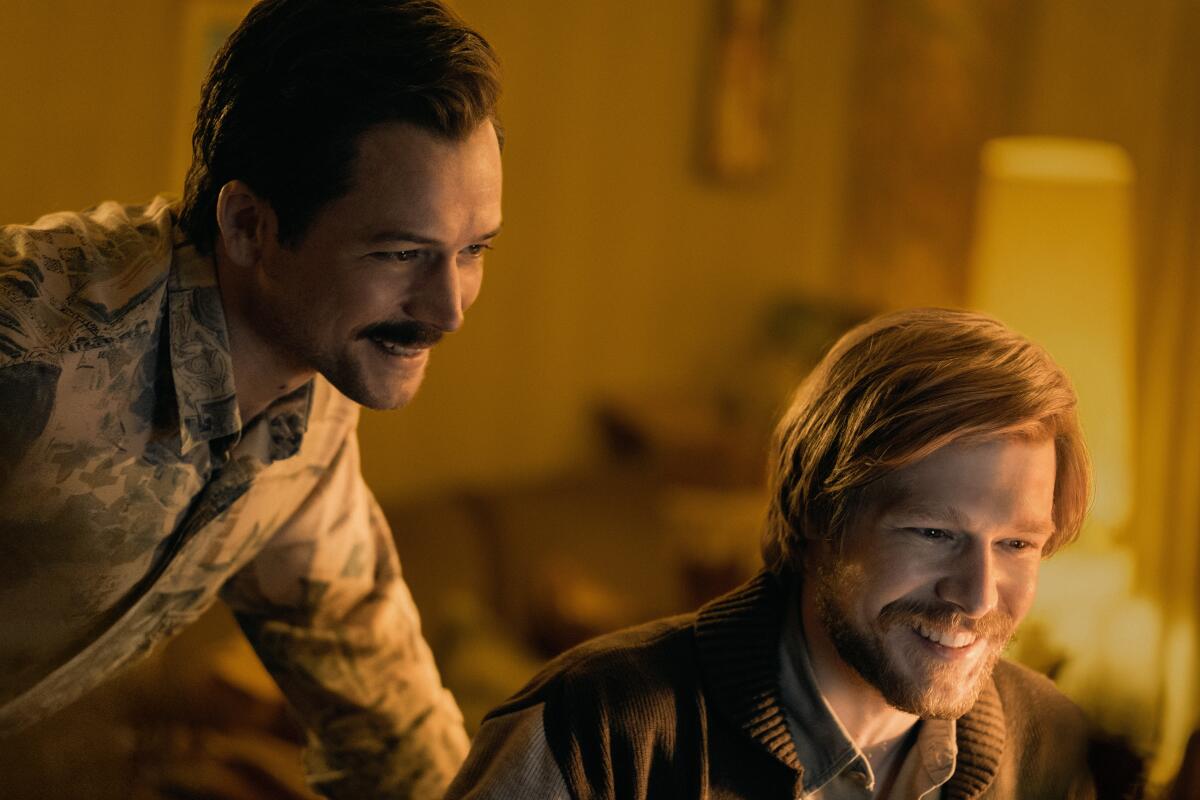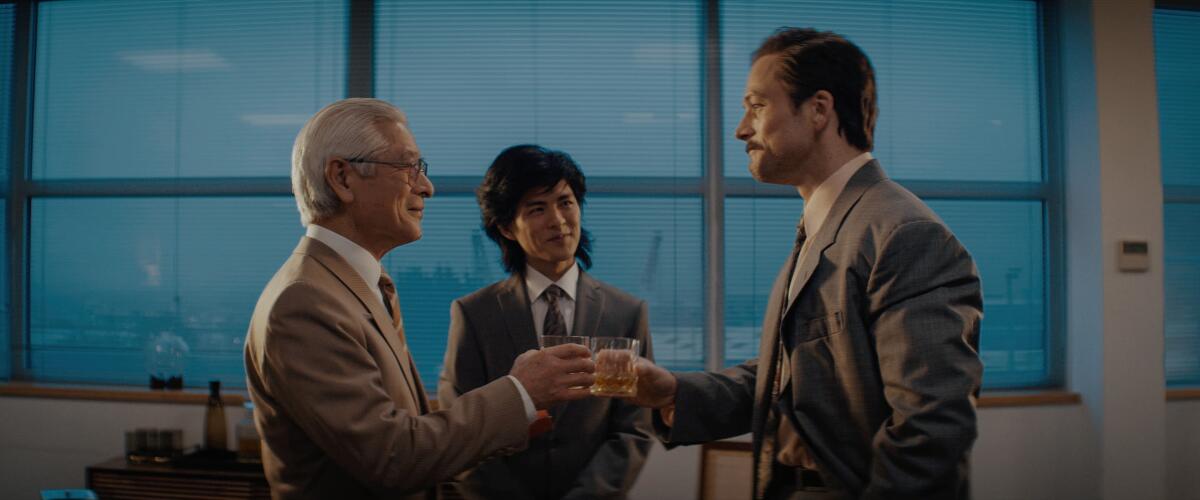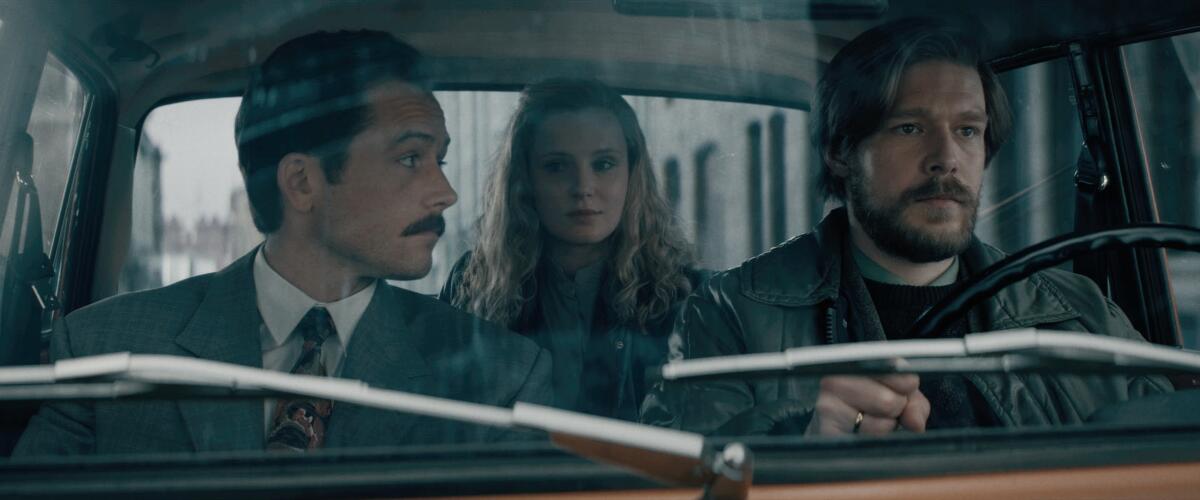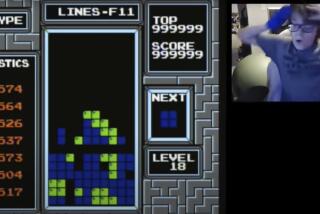Review: ‘Tetris’ will just really make you want to play Tetris

It’s funny to see what happens whenever a character first plays Tetris in the new movie “Tetris.” Two young girls, testing the game out at home, fall into a hushed kind of trance. Hiroshi Yamauchi (Togo Igawa), the famously poker-faced president of Nintendo, sets down his joystick and declares it “not bad” (high praise). And Henk Rogers (Taron Egerton), a mega-ambitious video-game entrepreneur who spies an early demo at a 1988 Vegas consumer electronics show, is so transfixed by those flipping, falling four-square pieces that they end up haunting his dreams. Maybe you’ll relate. Watching character after character succumb to Tetris’ spell, I certainly wanted nothing more than to cast everything aside — “Tetris” included — and go a few rounds with the game myself.
I have since done exactly that, and I’ll likely go a few more once I’ve finished my review and surrendered my obligations to think about this semi-diverting, curiously underwhelming movie. Don’t get me wrong: The disappointment of “Tetris” is not that it fails to reproduce the pleasures of an ingeniously simple, insanely addictive puzzle game. It’s more that the movie seems at a loss for how to play its own material. In teasing out Tetris’ convoluted Soviet-era origins, it tries, with only fitful success, to fit a series of disparate, fast-moving parts into a pleasingly coherent shape. The mix of busy comic exaggeration, affectionate ’80s nostalgia trip and gloomy mid-perestroika history lesson never comes together.
Slickly directed by Jon S. Baird (“Stan and Ollie”) from a strenuous, back-flipping script by Noah Pink, “Tetris” focuses not on how the game was invented — in 1984, by a genial Soviet mathematician and computer whiz named Alexey Pajitnov (Nikita Efremov) — but rather how it made its way out from behind the Iron Curtain and into eager hands worldwide. The result is a kind of Cold War-era Cinderella story for arcade junkies, in which Tetris finds an improbable Prince Charming in Nintendo (and specifically, Nintendo’s massively successful Game Boy handheld console) and becomes an unwitting harbinger of Soviet defeat, allowing Henk and other proud beneficiaries to live capitalistically ever after.

Henk is the eager-to-please hero of this eager-to-please movie, and Egerton plays him with a polished corporate-bedside manner, an eager-beaver mustache and enough warm, gregarious energy to almost neutralize your double take when he describes himself as being of partly Indonesian descent. Egerton is a strong, hard-working actor (see: “Rocketman,” the “Kingsman” movies), but this particular suspension of disbelief — maybe too polite a euphemism for a case of standard-issue Hollywood whitewashing — is tough to pull off in a story where cultural specificities are not exactly irrelevant.
At the same time, Henk’s ability to blur cultural and geographical boundaries is both a marker of his ambition and a key driver of his success. Dutch-born and American-raised, he makes his home in Tokyo with three cute kids and an overly patient wife, Akemi (Ayane Nagabuchi), who holds down the fort at home and at their fledgling video-game company, Bullet-Proof Software. Drowning in debt but convinced (rightly) that Tetris is a goldmine, Henk sets out to secure Japanese rights in a range of formats (video game, personal computer, arcade). In this mission he is at times absurdly lucky but also frustratingly rebuffed, mainly by the British publisher Mirrorsoft, led by the odious billionaire father-son duo of Robert Maxwell (Roger Allam, sneeringly one-note) and Kevin Maxwell (Anthony Boyle, thoroughly punchable).
But Henk’s calculations shift, and the stakes escalate, when Nintendo executives Howard Lincoln (Ben Miles) and Minoru Arakawa (Ken Yamamura) quietly unveil the first Game Boy — a “game over” moment that lends the movie its biggest, purest hit of nostalgia. The outcome by that point is assured, but the journey there is a long and complicated slog — for Henk as well as the audience. Things get especially messy once it becomes clear that — since things like intellectual property and private ownership don’t exist in the Soviet Union, but deceit and competition very much do — the rights to Tetris, which had been prematurely claimed by various entities including Mirrorsoft, are still very much for grabs.
To untangle this infernal web, Henk travels to Moscow, where he tumbles down a rabbit hole of misinformation and manipulation, political turmoil and thoroughly justified paranoia. He loses himself in the city’s chilly, functional spaces and menacing shadows, which provide an atmospheric contrast to the glassy London offices and warmer Tokyo interiors of Daniel Taylor’s versatile production design. Henk’s Russian arc also introduces by far the movie’s most compelling characters, including the shifty head of the government-controlled software company ELORG (a nuanced Oleg Stefan), a suspiciously sweet interpreter (Sofia Lebedeva) and, best of all, Alexey himself. At once the author and the primary victim of this whole dust-up, Alexey must stand by and watch as his brilliant creation is inflated into an emblem of the battle between East and West, but also reduced to Cold War spoils — a prize to be squabbled over by lesser, greedier minds.

The movie doesn’t illuminate so much as compound this problem. While its focus on cloak-and-dagger antics and he-said-he-said negotiations has obvious process-movie antecedents, “Tetris” falls short of both the genuinely crackling suspense of “Argo” and the bracing boardroom cynicism of “The Social Network” — or, frankly, of an average episode of “Succession.” Henk, like a lot of designated movie heroes, gets knocked about a little but is mostly flattered and sentimentalized (a subplot with his long-suffering family is unspeakably tiresome). His rivals, meanwhile, rarely rise above sniggering caricature, whether it’s Robert Maxwell, who at one point tries to leverage his friendship with Mikhail Gorbachev himself (Matthew Marsh), or a crafty middleman, Robert Stein (Toby Jones), who’s forever scheming to cut out his bigger, more powerful fellow players.
And they are all presented, in a belabored game-recognize-game metaphor, as players: The principal characters are given old-school avatars, and the movie’s many international locations are delineated using primitive video graphics. These visual touches are nicely evocative, though by the time Henk finds himself in a car chase through the streets of Moscow, enhanced with exploding 8-bit-style graphics that suggest an unusually dull and glitchy Super Mario Kart prototype, it’s hard not to sense the filmmakers’ desperation. It’s as if they were trying, too late, to tie “Tetris” back to Tetris, to introduce points of stylistic connection that go beyond composer Lorne Balfe’s playful variations on the game’s infernally catchy music.
It’s instructive that “Tetris” stirs to life only when Tetris itself takes center-frame, never more so than in a touching scene in which Henk and Alexey, future friends and collaborators, spend some time fiddling with the original, outdated version of the game. You’re seeing the beginnings of a tech-bromance for the ages; you may also wonder, not for the first time, why Alexey keeps getting sidelined in what should have been his story. Watching him rejigger lines of code with astonishing dexterity, you feel, at long last, a rush of artistic and intellectual excitement, a sincere delight in the creation — and perfection — of something of lasting value. “I’d forgotten how much fun this is,” Henk marvels from the sidelines. You’ll know what he means.
‘Tetris’
In English and Russian with English subtitles
Rating: R, for language
Running time: 1 hour, 58 minutes
Playing: Alamo Drafthouse Cinema, downtown Los Angeles; available March 31 on Apple+
More to Read
Only good movies
Get the Indie Focus newsletter, Mark Olsen's weekly guide to the world of cinema.
You may occasionally receive promotional content from the Los Angeles Times.











